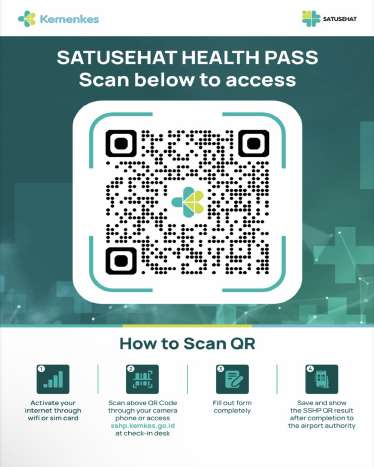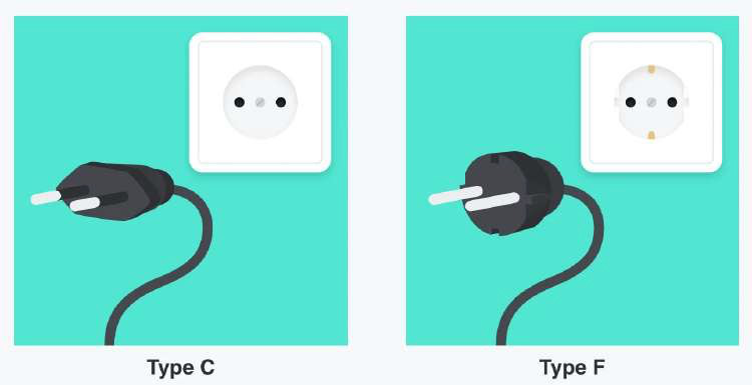Information on Bali
Arrival the the Airport

Health Protocol Guidelines
The government of Indonesia has tightened health screenings at the country’s entry points, particularly at airports, for incoming travelers from overseas. This measure aims to prevent the entry of new Mpox variants into Indonesia. Strict screening is enforced by requiring every international traveler, both Indonesian citizens and foreign nationals, entering Indonesia to fill out an electronic self-declaration form called the SATUSEHAT Health Pass.
The SATUSEHAT Health Pass electronic self- declaration form can be filled out online via the website https://sshp.kemkes.go.id. Upon arriving at any airport in Indonesia, delegates are required to complete the SATUSEHAT Health Pass. Once the form is submitted, a barcode with the passenger’s health and travel details will be generated. This barcode will be scanned by officials at the arrival gate. After scanning, the barcode can be saved for future use. The steps for completing the SATUSEHAT Health Pass for international travelers are as follows:
1. Access https://sshp.kemkes.go.id from your browser and click the “Start” button.
2. Choose your preferred language.
3. Complete all required fields.
4. After completing the form, a QR code will be generated, which you can save or keep the page open until it is successfully scanned by officials.
Immigration and Customs Clearance
All foreign nationals entering the Republic of Indonesia are required to undergo customs inspection. Delegates who are carrying cash amounts exceeding USD 10,000 (or its equivalent in other currencies) and/or articles subject to customs clearance must complete a customs declaration.
Passengers arriving on international flights are obliged to present their Electronic Customs Declaration (E-CD) to the customs officer upon arrival. The necessary information can be submitted via the official website: https://ecd.beacukai.go.id
General Information about Bali
Bali, often referred to as the Island of the Gods, is a stunning gem in the Indonesian archipelago. With its majestic volcanoes and lush terraced rice paddies, the island radiates tranquility and natural beauty, embodying Indonesia’s rich landscapes. Visitors are enveloped in the warm and vibrant atmosphere created by its hot, humid tropical climate, with average temperatures around 30 degrees Celsius (86 degrees Fahrenheit). The island is a cultural treasure, featuring exquisite temples, captivating traditional dances, and vibrant ceremonies, alongside a flourishing arts scene. Luxurious beachfront resorts offer a serene escape within this picturesque environment, showcasing Bali’s exceptional beauty and cultural heritage.
Climate and Weather
Bali’s tropical climate is marked by high humidity and two distinct seasons: dry and rainy. November falls within the rainy season, during which the island sees increased rainfall and humidity, with temperatures typically between 24-29°C (75-85°F). Although rain can be heavy, it usually occurs in brief afternoon or nighttime showers. Despite the rain, Bali’s vibrant landscapes, such as its green rice terraces and misty jungles, remain breathtaking.
Local Time
Indonesia spans three time zones:
- GMT +7: Waktu Indonesia Barat (WIB) for Sumatra, Java (including Jakarta), West Kalimantan, and Central Kalimantan.
- GMT +8: Waktu Indonesia Tengah (WITA) for Bali, Sulawesi, Lesser Sunda Islands, East Kalimantan, and South
- GMT +9: Waktu Indonesia Timur (WIT) for Maluku Islands and Indonesian
Currency Exchange
The national currency of Indonesia is the Rupiah (IDR), with typical exchange rates ranging from IDR 15,000 to IDR 16,000 for US$1.
Electrical Equipment and Drinking Water
In Indonesia, the electricity supply is 220 Volts, using plug types C and F. Tap water is not safe to drink; it is recommended to use bottled water.

Shopping Centers
Bali also offers a vibrant shopping scene, featuring a variety of shopping centers that focus exclusively on traditional Balinese goods. From local markets filled with handcrafted items to boutiques showcasing unique artisanal products, these are shopping centers that are popular among both tourists and locals alike.
Telecommunication
- Indonesia’s country code is +62.
- The area code for Bali is 0361, and for Jakarta is
- When dialing, omit the leading zero: +62 361 XXXXX or +62 21 XXXXX
- For international calls: 007 + country code + area code + phone
Emergency Contact
- Emergency Call 112
- Fire Department 113
- Police 110
Health Services
A medical facility for minor illnesses will be available at the venue for delegates, operating from 9 AM to 6 PM (UTC+8) on 11 November 2024. For major medical treatments, delegates will be referred to the local hospital, which offers 24-hour medical services, with a general practitioner on duty throughout the day.
Delegates are responsible for covering any hospital-related costs and should ensure they have adequate insurance coverage before traveling. Please find below few health facilities located nearby the venue:
No | Hospital | Address | Contact |
1 | Bali Mandara Hospital | Jl. Bypass Ngurah Rai No.548, Sanur Kauh, Denpasar Selatan, Kota Denpasar, Bali | (+62) 361 472 1338 rsud.balimandara@ gmail.com |
2 | BIMC Nusa Dua Hospital | Kawasan ITDC Blok D Nusa Dua 80363, Bali | (+62) 361 3000911 admin.nd@bimcbal i.com |
|
|
|
|
3 | Udayana University Hospital | Jl. Rumah Sakit Unud, Jimbaran, Kec. Kuta Sel., Kabupaten Badung, Bali 80361 | (+62) 361 895 3670 .id |
4 | Sanglah/Prof IGN Ngurah Hospital | Jl. Diponegoro, Dauh Puri Klod, Kec. Denpasar Bar., Kota Denpasar, Bali 80113 | (+62) 361 227 912 info@profngoerah hospitalbali.com |
5 | Siloam Hospital | Jl. Sunset Road No.818, Kuta, Kec. Kuta, Kabupaten Badung, Bali 80361 | (+62) 361 779 900 info.siloamhospital sbali@siloamhospi tals.com |
6 | Puskesmas Kuta Selatan (Kuta Selatan Primary Healthcare Center) | Jl. Srikandi No.40A, Benoa, Kec. Kuta Sel., Kabupaten Badung, Bali 80361 | (+62) 361 771 957 kutasel_dikesbadu ng@yahoo.com |
